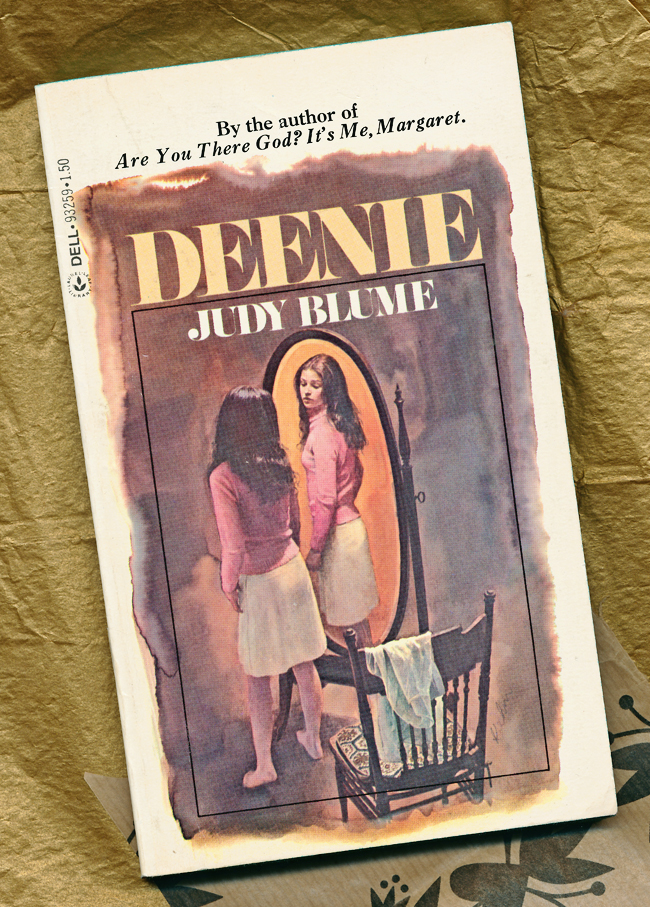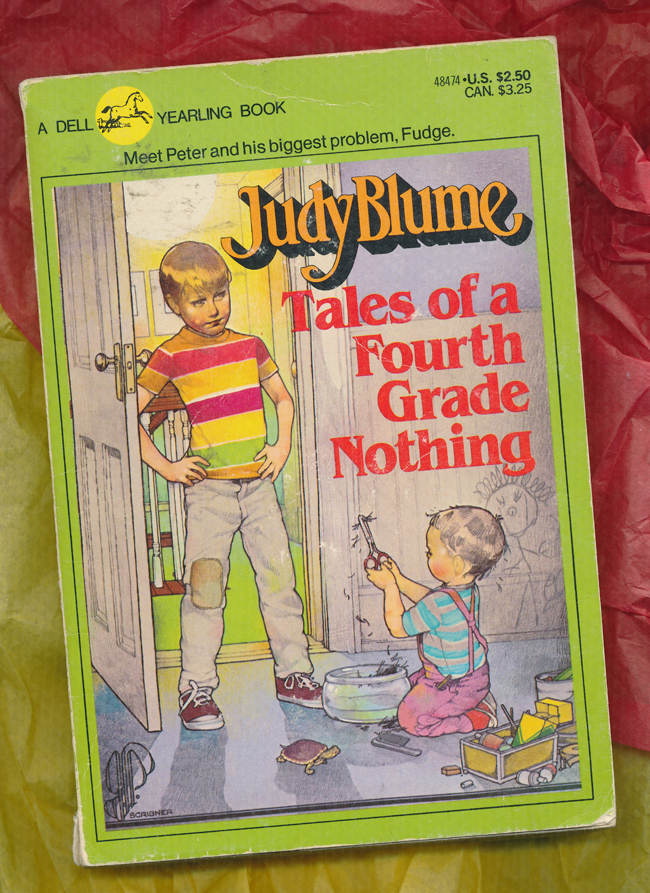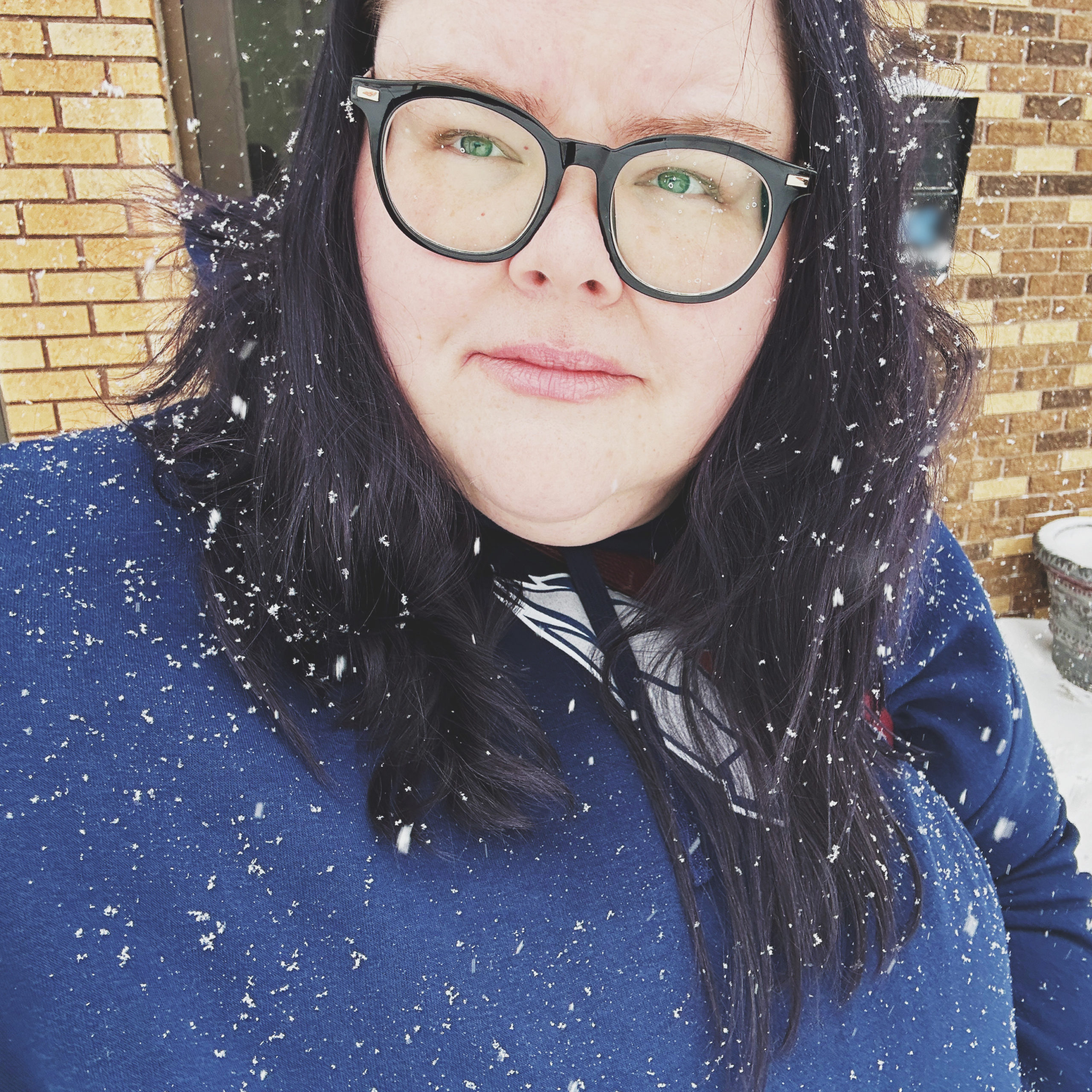|
|
 The exact edition from my youth. Bless those crazed vintage buyers. Dear Judy,
Deenie. Where do I even start?
Deenie was the second of your books to reach me in my youth and after rereading, I find myself with a fondness for Deenie and her story akin to the one I have for Margaret and hers. I see flaws in their characters more clearly than I did as a kid, but they are the ones who knew me when, two of my favorite companions on the torturous path of adolescence.
Okay, Judy, let’s get personal. By sixth grade — Deenie’s very age — I had already worked out the whole masturbating thing. Not just the doing it bit, but that it was normal, that it wouldn’t kill me, and that lots of people my age — people I actually knew even! — did it too. It was not a Big Deal. I can attribute this both to having a much older sister, well-adjusted and open parents, good friends, and the internet. Growing up in the internet age was by far the thing which most contributed to assuring me that I was not in fact a constantly mutating and grotesque monster. What a gift.
But, sadly, not every person I counted among my friends was as knowledgeable and while I can no longer remember most of the details, I somehow ended up in Serious Friendship Trouble with two of my friends — K and S — for “keeping secrets” with another and ended up confessing that we’d been talking about — gasp! — masturbation. I made this confession on what I think must’ve been an AlphaSmart or similar brand mini-laptop processor keyboard, which we all used on typing days to pass notes back and forth to each other. These two friends were totally weird about it, Judy, and for the first time I felt really weird about it! But, regardless of how horrified I might’ve been, I thought that was the end of that entire awkward moment.
Of course it wasn’t the end because adolescence is generally terrible and never-ending. A couple of days later, K presented me with her copy of Deenie. She’d been diagnosed with scoliosis at that year’s annual check and had started wearing her modern Milwaukee Brace — mostly plastic instead of metal and I don’t think she had a neck stabilizer and only wore it for two years, if memory serves — and she said, “You and I both have something in common with her.”
I can’t fully explain why this was a pivotal moment for me as a human being, but it was. I hadn’t ever been that close to K — she was very religious and very conservative and, to be slightly less than kind, totally uptight for a twelve-year-old — and she, of all people, had reached out in this extremely kind and gentle way. Sometimes adolescence was okay! We ended up bonding and she was my friendship rock over the summer because we spent hours on the phone talking about how scared we were to go to junior high. You brought us together, Judy! And that’s so cool. Fiction is remarkable for so many reasons, but its ability to draw people together is one of my very favorites.
As an adult, I also appreciate the frankness with which Mrs. Rappoport discusses masturbation with the girls in Deenie’s gym class. She tells them it’s okay! For everyone, boys and girls alike, and that it won’t kill them or make them crazy or weird! It’s so refreshing! And, after growing up in the weirdly repressed 90s, it seems shocking for its era to me as an adult. We always seem to assume that we’re advancing every year, getting better, but instead, we’re often going bizarrely backwards.
I really loved Deenie all over again. A lot. I love Helen and Deenie’s dad and when Janet and Midge take her to get a nightgown when they think she’s going to need an operation to correct her spine, I actually choked up. Friendship! I love Barbara! I even love the little bit of Helen’s romance with Joe. I love the strife of Deenie’s relationship with her mother and the pain of expectation and disappointment and all those tangled up feelings of what’s “meant” for you and struggling to figure out and be what you want to be. For some of us that struggle lasts well into adulthood and it never gets all that much easier.
Thanks for Deenie, Judy. I’m grateful for her sisterhood.
– Ash
ABOUT THIS PROJECT

Dear Judy,
First, allow me to apologize for my tardiness. This is not a Festive-Ass Flicks Situation, I literally lost a day this week and still have no idea whether it was Monday or Tuesday that I left in the dust somewhere. I thought yesterday was Tuesday and woke up this morning, ready to finish reading and write to you, but discovered it was Thursday while checking the weather. I even had a conversation with my dad about it being Wednesday yesterday because we both thought it was Tuesday. Was it aliens, Judy? I’m scared.
Second, Otherwise Known as Sheila the Great was pretty okay! Sheila is particularly irritating, even as a background character in Tales of a Fourth Grade Nothing, so I wasn’t particularly surprised at how irritating she was in her own book. I was surprised by how irritating everyone else was though.
Libby is a brat and Mouse is such a snot — I swear if she said “Don’t you think?” while trying to convince Sheila to be honest one more time I was going to reach through the book and smack her — and the twins are terrible. But as I grew more and more frustrated with them, I remembered: kids are awful, just utterly unbelievably awful. I was one. I was awful. Well done, Judy.
Part of why Sheila is so frustrating is because I was her, I was totally and completely her as a kid, and it’s really unpleasant — no matter how long it’s been, I’m 27! — to be reminded of what a monster you were. I was bossy and manipulative and I lied a lot because I just wanted people to like me. I even made a newspaper once! But I was at least smart enough to delegate stories to other kids. (I wrote a review of Mrs. Doubtfire and another girl went to work with her mom for a day and wrote about it. That’s all I can remember at this point. I’m getting so old.)
In the end, that was the saving grace of the book for me and made the irritation and frustration of youth worth it. I know that Sheila will grow up into a pretty awesome person. I know because I did. I know she’ll figure out that lying is a waste of her creativity as a person, that her bossiness can be better spent on getting things done when they need to be, and that… Well, she’ll probably realize that manipulating people is actually really useful and it will last well into adulthood. Sorry, Sheila. Two out of three ain’t bad.
Thanks for reminding me of where I came from, Judy. I needed it.
– Ash
ABOUT THIS PROJECT

Dear Judy,
I started talking about Tales of a Fourth Grade Nothing to my girlfriend last night while we were sitting at the dinner table. Dinner was delicious — mashed potatoes topped with chicken breast, broccoli, onions, and parmesan slivers — and I was expressing my displeasure at feeling pretty blocked with what to write about this one. I read it in about an hour and a half on Thursday morning, set it down on the side table next to our couch, and forgot about it immediately.
This isn’t to say it’s forgettable, Judy! Not at all. Quite the contrary, I learned, as my dinnertime conversation devolved into me screaming, “He ate the turtle! He just ate it! He just swallowed his brother’s turtle and no one cared. It was all ‘Poor Fudge!’ and ‘We have to save Fudge!’ and no concern that this sociopathic animal child just ate his brother’s pet!” I could say it’s unlike me to dissolve into outraged screams over fiction, but it’s really, really not.
I recounted Fudge’s many and sundry sins to my girlfriend as we were finishing up our meal and grew more and more outraged by the utterly dreadful parenting going on around these kids. They are so permissive of Fudge’s abominable behavior that it ends with him eating an animal alive! I wish you could hear me screaming through the internet, Judy, because I am that outraged. And then, once the drama of Fudge passing the turtle through his digestive tract has ceased, these atrocious parents buy the kid a puppy and joke that they made sure it would get too big for Fudge to eat.
Judy, can we stop and address the absolute terror you’ve inflicted on the world here? Fudge eats his brother’s pet! A tiny, helpless, living creature with whom his big brother Peter has formed a bond and with whom Fudge has been told time and time again not to touch. I am so traumatized!
I’ve never been a parent and, barring a large seismic shift in the universe, will never be, but even all other behavior aside, I can assure you that if my three-year-old ate someone’s pet, I’d at least be taking him in for psychiatric observation. This is not a cricket or a caterpillar or dirt. This is someone’s beloved companion. This will be the only thing I ever think about ever again in my life.
I am going to be screaming about this turtle being eaten by a three-year-old until I die. My last words are going to be, “He was just a little turtle! How could you?! How could you?!” and then I’ll expire in a great gust of breath and unanswered questions.
Judy, I love you, but gawd save you. Gawd save us all.
– Ash
P.S. RIP DRIBBLE
ABOUT THIS PROJECT

Dear Judy,
It’s Not the End of the World was… I’ve been sitting here trying to do a pun thing and I’m finally giving up. It’s Not the End of the World was okay!
It’s not a book I particularly identify with because, by the time divorce was imminent for my parents, I was kind of praying for it. And maybe that’s what struck me the most — that Karen could be living in a pretty toxic environment and not have realized what was coming, not been hoping for it. My parents are together now — the announcement of their forthcoming divorce ended in my mother’s attempted suicide, subsequent therapy, and a year of separation before they decided to reconcile — so clearly Karen and I were in very different boats, but I was her age! And I still knew what was coming. Granted, it was 1996 and divorce rates were almost double what they were when Karen was twelve, so I suppose I’ll account for relativity.
What I think amazed me most about reading this one was that I had a dual-reaction to every one of Karen’s freakouts — at one end, I understood, and was terribly frustrated on her behalf and kind of kept yelling to no one in particular, “She feels like her family is falling apart! Have a little compassion!” and at the other end, I was old and crotchety and telling her to get over it and stop being so dramatic. Divorce is not the end of the world! The title! THE TITLE!
Regardless of her drama, Karen’s got some good advice. While she’s out ice skating with her friends, she has a good laugh because her best friend is terrible at skating even though she’s been taking lessons for years. Karen remarks, “I had forgotten how good it feels to laugh. From now on I’m going to concentrate on laughing at least once a day–even more if I can arrange it.” And, let’s be real, that’s legitimately good advice. And an astute plan of action for a young kid. “Laughter is the best medicine” and all that, right?
Judy, this might be shocking to you, since you’re new around here, but I struggle, often, with managing my emotions. I just remarked on Twitter the other day that as we get older, we’re supposed to get better at it, but that it seemed like I’d never gotten there. I still sometimes react as strongly to hurtful or stressful things as I did when I was a tween. Granted, I was a very well-bahaved kid, that obnoxious one that never gets in trouble and teachers love and adults always say to their parents, “Oh, she’s so mature. Twelve going on thirty” etc etc. (I know it’s an obnoxious personality type! I own it! I owned it then! It’s who I am.) Regardless, I don’t always modulate my emotions well, is what I’m saying, and I’ve been in, to put it politely, a funk and I needed that reminder. Karen’s too right. I feel better when I laugh. I think we all do and we’d be well served to remember it.
I was going to end there, on Karen’s mighty wisdom, but even though that’s a great line and a wonderful reminder, it’s not my favorite passage in the book. No, no, not when Karen makes this sparkling observation early on: “If I had to describe myself I would say Karen Newman is ordinary looking. I plan to do something about that in a few years. I might wear purple eyeshadow.”
Now, Judy, I know pointing this out initially might sound mocking, but I swear I don’t mean it that way. I just love it. I love it. Because it’s not just about Karen being plain looking; it’s about her being the middle child, the forgotten one, no one’s favorite and how she can feel, even that early on, that she’s doomed to fade into background noise. But she won’t let that happen! She’s going to fix it and make herself noticeable. I love that. It’s such a youthful thought and such a hopeful one. I love you, Karen. Never change.
That goes for you too, Judy. Never change.
– Ash
ABOUT THIS PROJECT

Dear Judy Blume,
First, let me say that I’m sorry to hear about your recent bout with breast cancer and that I’m terribly glad that you were on the mend so quickly! And also thank you for writing about it with your usual honesty and good humor. You are as wonderful as ever.
Second, I read Then Again, Maybe I Won’t this week and it was nearly as enjoyable as Margaret. Granted, it is Margaret except with Tony’s boners, and wet dreams for Margaret’s periods and bras. And the central struggle with religion replaced with sudden wealth. Tony even moves to an unfamiliar suburb! Though for entirely different reasons than the Simons do.
Had I read this when I read Margaret, I would’ve been obsessed with boners and peeping on the neighbor girl and wet dreams because I was obsessed with boy things as a tween and teen. I know what periods and bras are like! I’ve been wearing a bra since I was, like, ten. But I’ve never had a boner! (I do remember the first boner I saw. I was in sixth grade. In high school I heard that he had three testicles. Three!)
As an adult though, I really loved the stuff about Joel constantly shoplifting and how much it upset Tony. When I was twelve or thirteen, one of my best friends shoplifted a bracelet from the dollar store at the mall and when she showed it to me I made her take it back! Because I too was completely outraged. She took it back and unlike Tony, it didn’t occur to me that I might look uncool or that she might be mad at me. I was just so shocked she’d take something! I was totally not cool. And I’m okay with that, I think.
I was also particularly interested in/upset about Joel’s mother changing their maid’s name because she couldn’t pronounce it. I was actually aghast and gasped out loud. And then when she did it to Tony’s mother! I would’ve been even more outraged than Tony was if someone had done that to my mother and especially to have her accept it so readily in the name of fitting in. I know that lots of versions of this have happened and likely continue to happen. I know that changing a servant’s name is an act of subjugating and othering them, alienating them from their identity and self. I know all of this historically and logically, but damn does fiction bring stuff home. Thanks, Judy. Bless.
The Kirkus review on the back of the book talks about Tony’s problems not being “magically resolved” but I was sort of aching for that by the end. Tony goes to therapy! And starts to learn to deal with his anxiety and stress, which was great and also kind of refreshing! Joel gets busted for stealing, which is also great. But the one problem I wanted to see a happy ending to was Tony’s grandmother. I was so angry at Mrs. Miglione for not standing up to Maxine and getting her mother back in the kitchen where she was happy. Infuriating to my bones! But Kirkus isn’t wrong, it’s not a bad thing that some of Tony’s issues go unresolved. That’s what life is like, right? Even when it’s frustrating as hell.
I might not have had this one as a kid, but thanks for it anyway, Judy.
– Ash
ABOUT THIS PROJECT
|
|





